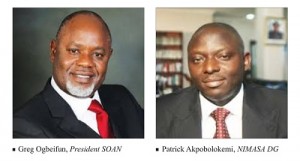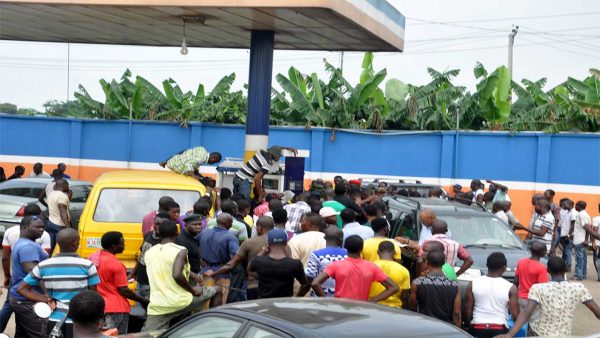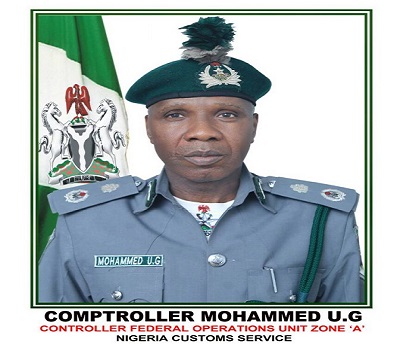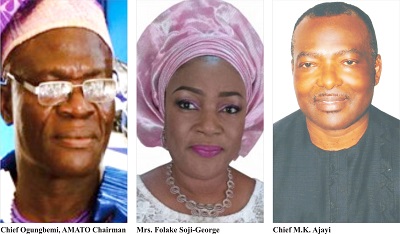Birth Of New Shipowners Association: End to Members’ Travail?
 The anguish, frustration and imminent neglect of indigenous ship owners in Nigeria are not unknown to operators in the maritime industry.
The anguish, frustration and imminent neglect of indigenous ship owners in Nigeria are not unknown to operators in the maritime industry.
The local ship owners have not been able to measure up with their international counterparts in the same business due to inability to acquire modern facilities and equipment to carry out their trades in the international waters.
Their problems were further worsened by the inability of the members of this group to access the Cabotage Vessel Finance Fund (CVFF) which was originally intended to help develop the trade in the maritime industry.
Members of this group came together under a common front called the Indigenous Ship-owners Association of Nigeria (ISAN) which was later re-christened Nigeria Ship-owners Association of Nigeria (NISA) with the aim of achieving their objectives of rejuvenating the trade in the country.
Captain Dada Labinjo, who was the General Secretary of NISA for twelve years, emerged the National President in a general election, last year.
Feeling uncomfortable with the emergence of Labinjo as the leader of the association with the notion that he might not steer the ship to a safe berth and to also represent the interest of members, some of the members both those that won elections alongside him and those who lost opted out, hence, the emergence of Ship Owners Association of Nigeria (SOAN).
The birth of SOAN is not a surprise to many who had earlier thought the same line.
The new association according to the executives is made up of core ship owners unlike NISA where ancillary service providers are part of the membership.
Now that there are two associations is there likely to be an end to the perennial travails of the ship owners?
Will the associations work together or against each other? If they can drop their egos and work together, the members may witness a new dawn but if they clash in interest, the worse may be the lot of the members.
On another note, which of the two associations will get the attention of the relevant government agencies in the maritime sector especially now that the embattled president of NISA has been asked to step aside pending the determination of the ship acquisition allegation against him?
However the two associations have mission statements and visions guiding their operations. The most prominent and common mission drive of the associations is to get the jobs back for members. This refers to the fact that the lifting of crude and other jobs which Nigeria ship owners have been denied will be pursued vigorously and taken back in order to bring back life to the business in the country.
Also, another important factor to the newly formed SOAN is to improve the maritime and shipping industry to the benefit of SOAN members, stakeholders, the industry and the country at large.
In the maiden address during the inauguration of the new association, the president, Mr. Greg Ogbeifun said, “We are grateful to members of SOAN, stakeholders and our respective guests who have responded to our invitation. We are also grateful to the media practitioners who are here to propagate the birth of SOAN to the general public.
“The present membership of the Association is encouraging and attractive. Membership of the association is open to both Nigerian and non-Nigerian shipowners of the country, whilst the Association will also consider applications from other Organisations or establishments critical to the shipping industry on a case by case basis.
The president listed the following as the objectives of the association:
To promote the interest of Nigerian owned vessels and to provide a forum for dialogue between Nigerian Shipowners among themselves and with any other interests on topical issues, policies and practices pertaining to the business of shipownership and management.
To facilitate participation of Nigerian shipowners in international for a on shipping matters, through effective representation in such meetings.
To cultivate and maintain good relation with the government and maritime authorities by contributing expertise in formulating policies and regulations on National Shipping and maritime activities.
To vigorously pursue the training, employment and welfare of Nigerian seafarers on board Nigerian owned vessels.
To contribute to the development of the shipping and maritime industry by promoting, encouraging, supporting and patronizing ship building and ship repair yards located in and owned by Nigerians.
To support the government and relevant agencies in the compliance with applicable IMO and ILO instruments.
To promote and support the growth and development of the shipping business of members.
Meanwhile, during his inauguration as the president of NISA last year, Capt. Labinjo had this to say:
“One of my agenda for NISA is the road-map for seafarers training. These were the things I have said that I will do; these are the things we will pursue with vigor. And once we are inaugurated, I will take the issue of getting back our jobs squarely, especially from the ‘usurpers’”
“Our second agenda is the strategy to get our ship-yard and ship repair-yard functional. This will become necessary as a result of the infrastructural development which is due to follow a prosperous shipping regime, which all of us would soon collectively entrench.
“There would always be infrastructural development which would be reflected in the development of ship-repair yards or shipyard, because, this usually follow a prosperous shipping service.
“It is unheard of that foreign vessels will operate in our waters without waiver. The waiver provision in our Cabotage law itself is vista to allow for shortfalls in shipping service provision. And where there is no short fall, there is no need for a waiver.
“Yet, the vessels that work in our waters are not specialized vessels that the Nigerian ship-owners cannot provide. They are not! Including an FSO…the Nigerian ship-owners are providing them.
“So, where is the need for the waiver? It is just that we have been allowing the foreign companies to operate 10,000 tons, 15,000 tons and 30,000 toners-vessels in our waters in Nigeria. These are shipping services that the average Nigerian ship-owners can provide. And that is why we must get back our jobs from them, immediately after our inauguration! But, like I told you, the entire membership would be involved.
“The truth is that I have never kept my plans secret. I have made my plans open as to what I was coming to do. During the campaigns and particularly, both at the debate session and at my post-election statement, I have openly indicated that I have a single mission; to bring back the jobs of our members!” he highlighted, adding that the task is everyone’s task, only that it is compulsory that one person must be at the driver’s seat.
“So, it is the strategy to bring back our jobs that we are fine-tuning. We need to have all our members’ ships engaged; and that is my immediate concern, and that will start manifesting, the moment we are inaugurated”, he stated further.
From the statements made by the representatives of the two associations, it is visible that they both mean well for their members but the fear remains that the issue of ego may becloud all these lofty ideals purported by the two associations as each association will be working to make sure that its voice is heard and in the process, the members may be pushed to the background.
Another issue that will be of interest is which of the associations will have the attention of the government agencies in the port? Or are they going to be given same recognition and have same attention before the government.
All these factors remain to be desired and only time can do desirable justice to the questions raised. An adage says the sky is enough for birds to fly only if the associations can only accommodate each other and find a common ground to work together.








